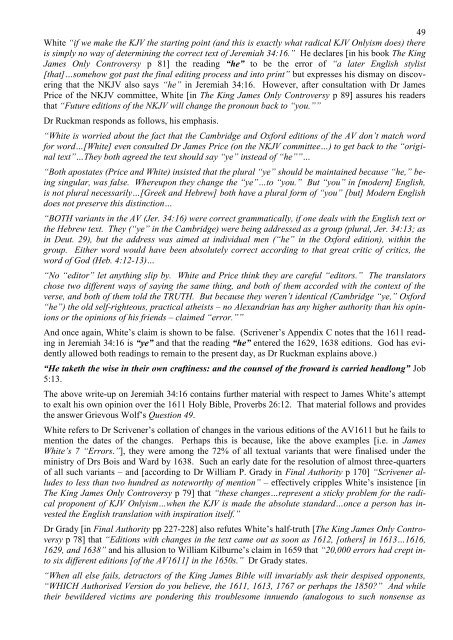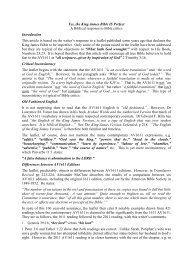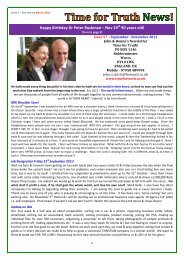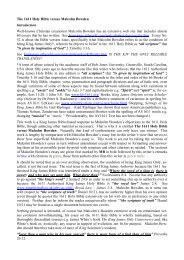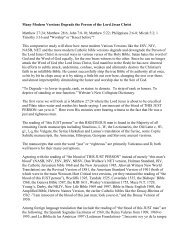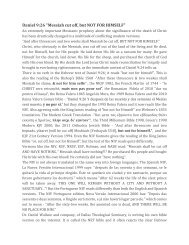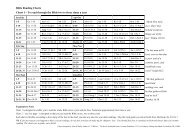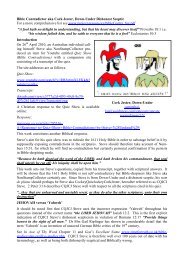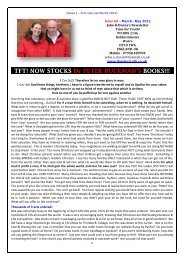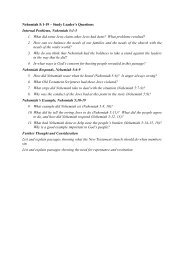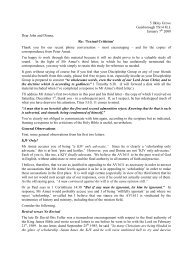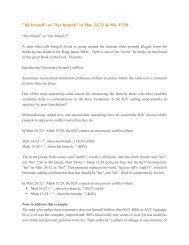A Grievous Wolf - Time for Truth
A Grievous Wolf - Time for Truth
A Grievous Wolf - Time for Truth
You also want an ePaper? Increase the reach of your titles
YUMPU automatically turns print PDFs into web optimized ePapers that Google loves.
49<br />
White “if we make the KJV the starting point (and this is exactly what radical KJV Onlyism does) there<br />
is simply no way of determining the correct text of Jeremiah 34:16.” He declares [in his book The King<br />
James Only Controversy p 81] the reading “he” to be the error of “a later English stylist<br />
[that]…somehow got past the final editing process and into print” but expresses his dismay on discovering<br />
that the NKJV also says “he” in Jeremiah 34:16. However, after consultation with Dr James<br />
Price of the NKJV committee, White [in The King James Only Controversy p 89] assures his readers<br />
that “Future editions of the NKJV will change the pronoun back to “you.””<br />
Dr Ruckman responds as follows, his emphasis.<br />
“White is worried about the fact that the Cambridge and Ox<strong>for</strong>d editions of the AV don’t match word<br />
<strong>for</strong> word…[White] even consulted Dr James Price (on the NKJV committee…) to get back to the “original<br />
text”…They both agreed the text should say “ye” instead of “he””…<br />
“Both apostates (Price and White) insisted that the plural “ye” should be maintained because “he,” being<br />
singular, was false. Whereupon they change the “ye”…to “you.” But “you” in [modern] English,<br />
is not plural necessarily…[Greek and Hebrew] both have a plural <strong>for</strong>m of “you” [but] Modern English<br />
does not preserve this distinction…<br />
“BOTH variants in the AV (Jer. 34:16) were correct grammatically, if one deals with the English text or<br />
the Hebrew text. They (“ye” in the Cambridge) were being addressed as a group (plural, Jer. 34:13; as<br />
in Deut. 29), but the address was aimed at individual men (“he” in the Ox<strong>for</strong>d edition), within the<br />
group. Either word would have been absolutely correct according to that great critic of critics, the<br />
word of God (Heb. 4:12-13)…<br />
“No “editor” let anything slip by. White and Price think they are careful “editors.” The translators<br />
chose two different ways of saying the same thing, and both of them accorded with the context of the<br />
verse, and both of them told the TRUTH. But because they weren’t identical (Cambridge “ye,” Ox<strong>for</strong>d<br />
“he”) the old self-righteous, practical atheists – no Alexandrian has any higher authority than his opinions<br />
or the opinions of his friends – claimed “error.””<br />
And once again, White’s claim is shown to be false. (Scrivener’s Appendix C notes that the 1611 reading<br />
in Jeremiah 34:16 is “ye” and that the reading “he” entered the 1629, 1638 editions. God has evidently<br />
allowed both readings to remain to the present day, as Dr Ruckman explains above.)<br />
“He taketh the wise in their own craftiness: and the counsel of the froward is carried headlong” Job<br />
5:13.<br />
The above write-up on Jeremiah 34:16 contains further material with respect to James White’s attempt<br />
to exalt his own opinion over the 1611 Holy Bible, Proverbs 26:12. That material follows and provides<br />
the answer <strong>Grievous</strong> <strong>Wolf</strong>’s Question 49.<br />
White refers to Dr Scrivener’s collation of changes in the various editions of the AV1611 but he fails to<br />
mention the dates of the changes. Perhaps this is because, like the above examples [i.e. in James<br />
White’s 7 “Errors.”], they were among the 72% of all textual variants that were finalised under the<br />
ministry of Drs Bois and Ward by 1638. Such an early date <strong>for</strong> the resolution of almost three-quarters<br />
of all such variants – and [according to Dr William P. Grady in Final Authority p 170] “Scrivener alludes<br />
to less than two hundred as noteworthy of mention” – effectively cripples White’s insistence [in<br />
The King James Only Controversy p 79] that “these changes…represent a sticky problem <strong>for</strong> the radical<br />
proponent of KJV Onlyism…when the KJV is made the absolute standard…once a person has invested<br />
the English translation with inspiration itself.”<br />
Dr Grady [in Final Authority pp 227-228] also refutes White’s half-truth [The King James Only Controversy<br />
p 78] that “Editions with changes in the text came out as soon as 1612, [others] in 1613…1616,<br />
1629, and 1638” and his allusion to William Kilburne’s claim in 1659 that “20,000 errors had crept into<br />
six different editions [of the AV1611] in the 1650s.” Dr Grady states.<br />
“When all else fails, detractors of the King James Bible will invariably ask their despised opponents,<br />
“WHICH Authorised Version do you believe, the 1611, 1613, 1767 or perhaps the 1850?” And while<br />
their bewildered victims are pondering this troublesome innuendo (analogous to such nonsense as


